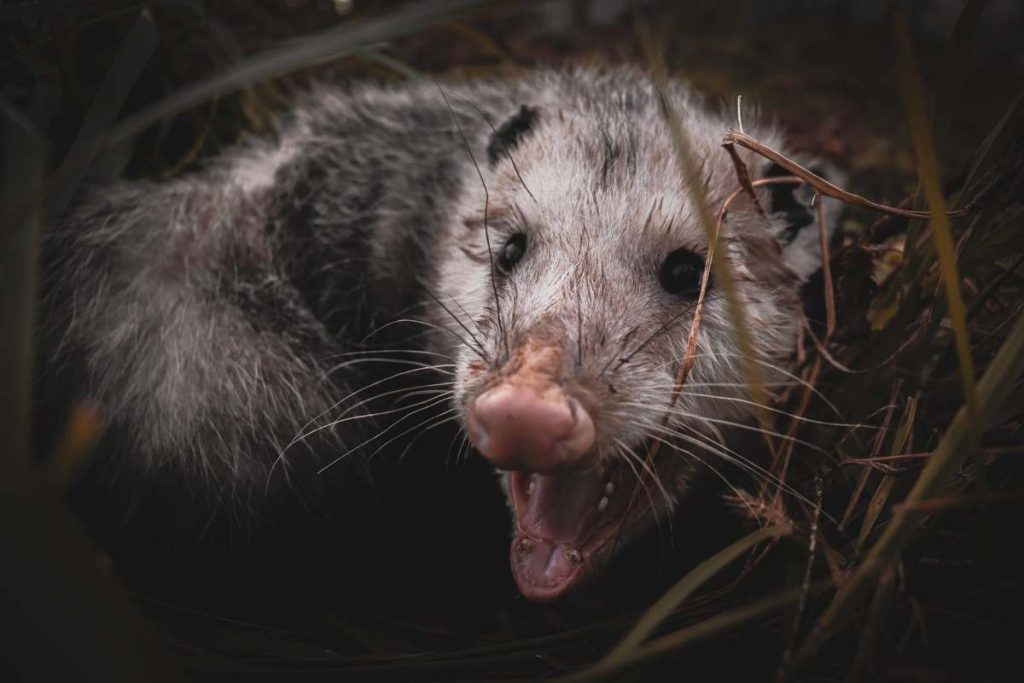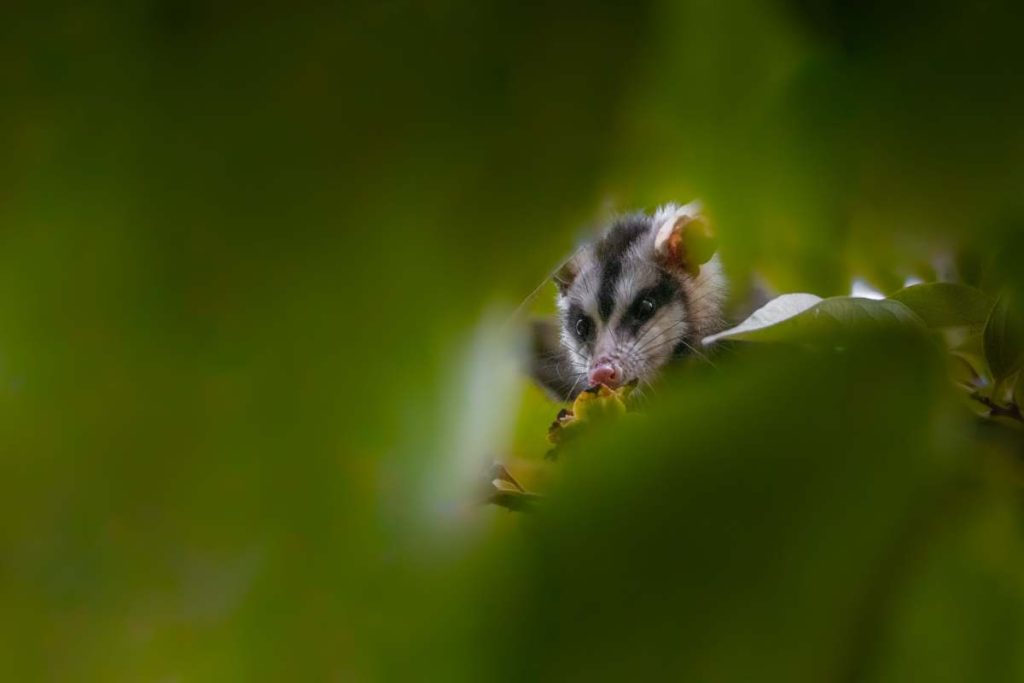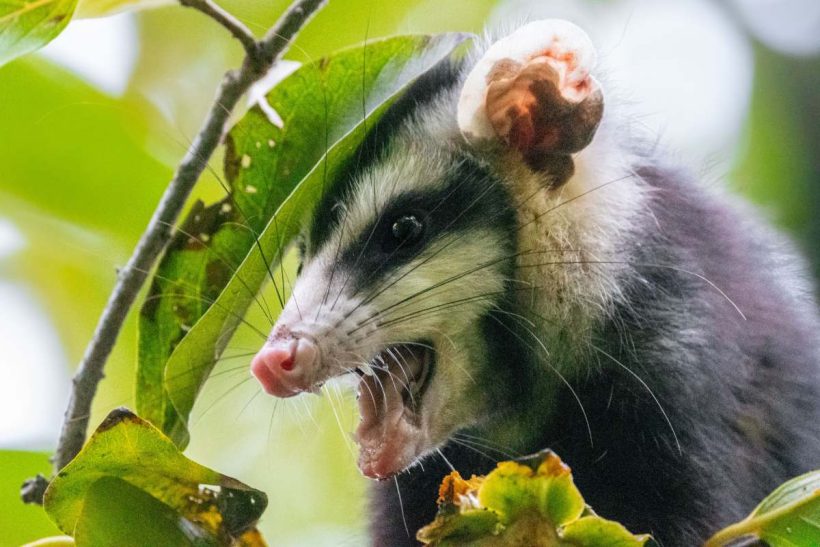If you’ve ever seen a possum in your yard or heard complaints from others about these nocturnal animals, you might wonder if they’re a threat or just a nuisance. Opossums, often misunderstood, are frequently blamed for issues like rummaging through garbage cans or invading gardens.
However, understanding their behaviour and the legalities of handling them can help you manage any encounters more effectively. This guide will clear up common myths about possums, explain what to do if they invade your home, and help you decide whether to tackle the problem yourself or call a professional.
Are possums aggressive?
Opossums often get blamed for getting into garbage cans or gardens, but they usually aren’t the culprits. They might clean up the mess left by other animals, though! They’re also rarely responsible for killing chickens, despite common accusations. Most complaints about opossums are simply about their presence, not any real damage they cause.
Opossums are not aggressive. Their open-mouthed hissing is just a bluff to look scary. If that doesn’t work, they’ll play dead when very frightened. In fact, opossums can be helpful in your garden by eating pests like snails, slugs, insects, and even small rodents. They also clean up spilt garbage and fallen fruit.
If you find an opossum in your backyard, don’t worry. They aren’t a threat and will likely move on soon. To keep them from visiting, make sure your garbage cans have tight-fitting lids and avoid leaving pet food outside overnight.

Is it illegal to trap possums in Australia?
In Australia, laws regarding trapping possums vary by state and territory. In general, possums are protected under wildlife conservation laws, and it’s illegal to harm or kill them. Here are some key points:
- New South Wales (NSW): It’s illegal to trap and relocate possums without a license. If you have a possum problem, you should contact a licensed wildlife rehabilitator or pest controller.
- Victoria: You can trap possums on your property but must release them within 50 meters of where they were captured. Relocating them further away is illegal.
- Queensland: Trapping and relocating possums is illegal without a permit. You should contact local wildlife services for assistance.
- South Australia: Trapping possums requires a permit, and they must be released on the same property where they were captured.
- Western Australia: Similar to other states, possums are protected, and trapping without a permit is illegal. Contact local wildlife authorities for help.
- Tasmania, Northern Territory, and Australian Capital Territory: Laws are similar, with permits required for trapping and relocation restricted.
If you’re dealing with a possum issue, it’s best to contact local wildlife authorities or a licensed professional to ensure you comply with local laws and protect the animals.
What should I do if possums are invading my house?
If possums are invading your house, here are some steps you can take to address the issue:
- Identify Entry Points: Check for any holes, gaps, or broken screens where possums might be entering your home. Common entry points include roof spaces, vents, chimneys, and eaves.
- Seal Entry Points: Once you’ve identified the entry points, seal them off to prevent possums from getting inside. Use strong materials like metal mesh or hardware cloth. Ensure that all potential entry points are secure.
- Remove Food Sources: Possums are attracted to food. Ensure that pet food, garbage, and other food sources are secured. Use sealed containers and keep outdoor areas clean.
- Install Possum Deterrents: Use possum deterrents such as motion-activated lights or sprinklers around your property. You can also try using natural deterrents like garlic spray or commercially available possum repellents.
- Prune Trees and Shrubs: Trim back any tree branches or shrubs that provide easy access to your roof or house. This can help reduce the likelihood of possums getting into your home.
- Install Possum Boxes: Providing an alternative habitat for possums, such as possum boxes in trees away from your house, can encourage them to move out of your roof and into a more suitable environment.
- Contact Wildlife Authorities or Professionals: If the possum problem persists, contact local wildlife authorities or a licensed pest control professional. They can safely and legally remove the possums and provide further advice on preventing future invasions.
It’s important to handle possums humanely and in accordance with local wildlife protection laws.

Can I get rid of possums myself or should I call a professional possums removal?
Whether you can handle possum removal yourself or need to call a professional depends on the severity of the problem and your comfort level with dealing with wildlife. Here are some considerations to help you decide:
DIY Possum Removal
- Identifying and Sealing Entry Points: If you can safely locate and seal the entry points where possums are getting into your house, this can be an effective first step.
- Using Deterrents: Installing deterrents like motion-activated lights, sprinklers, or natural repellents can help keep possums away.
- Removing Food Sources: Securing food sources and maintaining a clean yard can make your property less attractive to possums.
- Installing Possum Boxes: Providing alternative habitats can encourage possums to relocate naturally.
When to Call a Professional
- Persistent Problems: If you have a recurring possum problem despite your efforts, a professional can provide more effective, long-term solutions.
- Safety Concerns: If the possums are aggressive or if you’re uncomfortable dealing with wild animals, it’s safer to call a professional.
- Legal Compliance: Professional pest controllers are familiar with local wildlife laws and can ensure that possums are removed legally and humanely.
- Expertise and Tools: Professionals have the necessary tools and expertise to handle possum removal effectively and can provide advice on preventing future invasions.
Steps to Take if Calling a Professional
- Research: Look for licensed and reputable wildlife removal services in your area.
- Consultation: Many professionals offer consultations to assess the situation and provide a plan of action.
- Preventative Measures: After removal, professionals can help you implement measures to prevent future possum invasions.
In general, starting with DIY methods can be a good first step, but don’t hesitate to call a professional if the problem persists or if you’re unsure about handling it yourself.
Final thought
In most cases, possums are not aggressive and can actually be beneficial to your garden by controlling pests and cleaning up fallen fruit. If you find one in your backyard, there’s no need to panic—they are more likely to move on soon.
To keep them from coming back, make sure your garbage cans are secure and avoid leaving pet food outside. However, if you face persistent issues or feel unsure about handling the situation, contacting a professional wildlife removal service is a wise choice. By taking the right steps, you can manage possum encounters effectively while respecting these unique creatures and following local wildlife laws.









